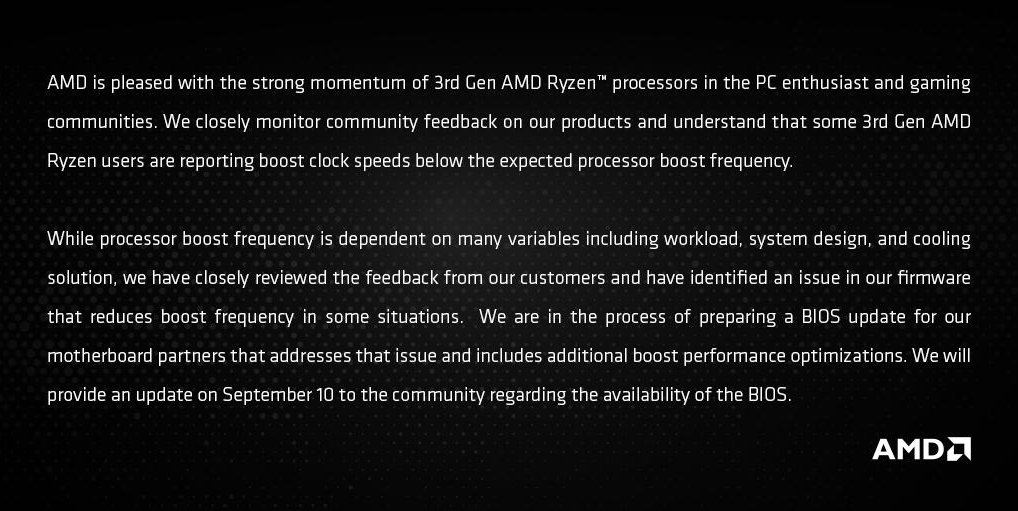Sabrewulf...
Gawd
- Joined
- Jan 18, 2008
- Messages
- 1,019
Source

https://www.tomshardware.com/news/amd-ryzen-3000-boost-frequency-bios-fix,40308.html
"The statement comes amidst a growing chorus of complaints from Ryzen 3000 owners on forums, reddit, and social media that their chips aren't reaching the advertised boost clocks. In response to the growing number of complaints, YouTuber Der8aeur recently conducted a survey that garnered 2,700 respondents, of which only 5.6% were able to reach the advertised boost clocks for AMD's flagship Ryzen 9 3900X processor.
Our own investigation of AMD's new boost clock behavior also found that only one core on any given Ryzen 3000 CPU can hit the rated boost clock, which AMD confirmed. That means the Ryzen 3000-series processors contain a mix of faster and slower cores, which is a departure from how AMD and its competitors have traditionally spec'd processors. Unfortunately, users must have the latest version of Windows 10 to use the Ryzen-aware scheduler, which targets the fastest cores with lightly-threaded applications, further complicating matters for frustrated customers trying to attain the advertised boost frequencies.
In either case, even with the presence of the necessary BIOS, driver, and Windows 10 scheduler, most customers have been unable to attain Ryzen 3000's advertised speeds with any of the models"
Hopefully it helps!

https://www.tomshardware.com/news/amd-ryzen-3000-boost-frequency-bios-fix,40308.html
"The statement comes amidst a growing chorus of complaints from Ryzen 3000 owners on forums, reddit, and social media that their chips aren't reaching the advertised boost clocks. In response to the growing number of complaints, YouTuber Der8aeur recently conducted a survey that garnered 2,700 respondents, of which only 5.6% were able to reach the advertised boost clocks for AMD's flagship Ryzen 9 3900X processor.
Our own investigation of AMD's new boost clock behavior also found that only one core on any given Ryzen 3000 CPU can hit the rated boost clock, which AMD confirmed. That means the Ryzen 3000-series processors contain a mix of faster and slower cores, which is a departure from how AMD and its competitors have traditionally spec'd processors. Unfortunately, users must have the latest version of Windows 10 to use the Ryzen-aware scheduler, which targets the fastest cores with lightly-threaded applications, further complicating matters for frustrated customers trying to attain the advertised boost frequencies.
In either case, even with the presence of the necessary BIOS, driver, and Windows 10 scheduler, most customers have been unable to attain Ryzen 3000's advertised speeds with any of the models"
Hopefully it helps!
![[H]ard|Forum](/styles/hardforum/xenforo/logo_dark.png)
